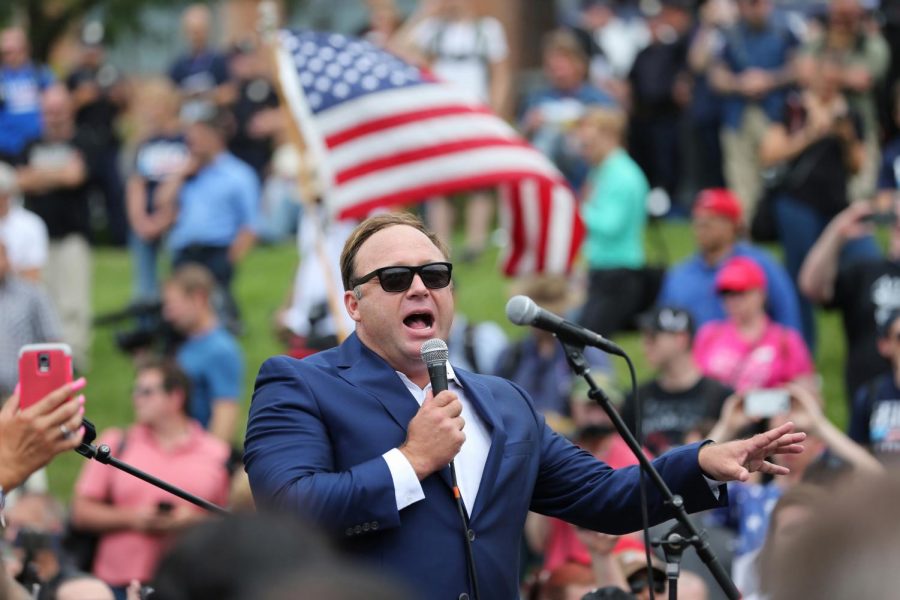“I can’t talk right now. Alex Jones is making fun of my face.”
That’s how CNN’s Oliver Darcy humorously replied to a phone call, an uncomfortable grin emerging as Jones accused Darcy of being part of a modern-day Stasi. Jones was fixated on Darcy’s eyes, which he described as those of “a rat” and a “possum.”
The reporter said very little, aside from a few attempts to disengage and defuse the exchange. Jones took up nearly 10 minutes raving about censorship, mainstream media lies and indoctrination happening in such places as “bars and hotels,” all while blockading a hallway on Capitol Hill.
With such an outrageous business model filled with ad hominem and straw man attacks, it makes sense that mediation may be required on behalf of those who have been giving Jones an outlet. Yet the provocateur seemed vindicated by his subsequent ban on Twitter, the same platform to which this video was posted. This is his latest in a long string of platform bans starting with his app’s erasure from the Apple Store. Pundits from the right to the left used Jones’s word — “censorship” — to protest an apparent collusion of organizations to shut him down.
Censorship is a strong word. With the weight it carries, it cannot be confused with basic, self-regulating arbitration, an essential part of political discourse that typically spares us from cantankerous trolls of the likes of Jones. Being outraged by moderation diverts the focus of activists, particularly conservatives, away from policy and more toward demonizing the left, playing right into the hands of those who peddle fear and profit from division — just like Alex Jones himself.
The American Civil Liberties Union (ACLU) has a very broad definition of censorship, describing it as a successful attempt to force one’s “personal political or moral values on others” by the government or a private group. However, there is a distinct difference between censorship by private and government institutions: the government can’t shut down the press, individuals or movements to block them out.
Without a doubt, protecting America from real censorship is an absolute priority. In countries with authoritarian governments, censorship can come in the form of journalist imprisonment, assassination of critics or heavy internet restrictions. But that’s a far cry from an individual like Alex Jones being squeezed out of media platforms run by private institutions. Alex Jones is still a free man who can still run his own website and talk show — he only lost the privilege of using the platforms of others.
If we are to call any attempt by organizations and individuals to moderate dialogue an act of censorship, we make social and journalistic institutions harder to navigate. After all, moderation is nothing new: sites have been eradicating “trolling” since the early days of social networking because it gets in the way of actual conversation and information. It’s the same principle in real life. If someone starts calling you names and screams at you relentlessly in your home, you can tell them to leave. If you are out in public, you may be asked to leave as well.
There’s room for small spats and the occasional heated fight, but “trolls” are defined by a pattern of hostility that permeates in the community. The government has no right to enforce that arbitration. But as an individual, a consumer of information, we may have standards we expect media outlets to hold us to. If America is waking up to the uselessness of the raves of provocateurs like Alex Jones, it is fitting that his presence will lose support on these privately-run platforms.
There is certainly some room for abuse, and I’m not saying there aren’t any instances of social media censoring groups. But real concerns tend to begin when the government gets involved. This summer, Facebook removed 32 liberal and conservative pages alleged to be fake accounts while its CEO Mark Zuckerberg was being pressed by government officials regarding Facebook’s role in election interference. If they really were fake and controlled by troll factories (which are real), I concur with the decision — but is this a sign the government can influence social media companies’ decisions by intimidation? Moreover, Immigrations and Customs Enforcement was reported earlier this year to be using Facebook data to track down potential undocumented immigrants. Questionable cooperation between the government and media companies is far worse an omen than private self-regulation.
That said, I argue holding popular accounts to a behavior policy, as in Jones’s case, isn’t the same ballpark as censorship. Whether these policies are applied equally is an open question.
Opposing the public condemnation of someone with a pattern of fear mongering, blatant bigotry and ludicrous fact skewing is not only irrelevant to the Constitution but harmful to a path of a better political atmosphere. It is not anti-American to want, as a consumer, standards in fact-checking and respectability. If we want a more perfect union, these lines need to be drawn. I’m drawing one at “eyes of a rat.”
James Mazarakis is a Collegian columnist and can be reached at [email protected].





















Benjamin Duffy • Sep 10, 2018 at 10:49 pm
Alex Jones simply lost his platform. Much like Colin Kaepernick, that insane, toxic, libelous peddler of a blood libel against American police.
Amy Lieu • Sep 10, 2018 at 10:25 am
So the ACLU defines what censorship is? It’s the authority?
The fact is that Alex Jones was censored and it speaks to two things. 1. How pathetic liberals are. They perceived a crackpot fringe conspiracy theorist as a threat to them and sought to shut him down. I would say that’s pretty pathetic but as we have seen from liberals lately they are consistently losing. It’s just another sign in my opinion of their stupidity and political incompetence.
2. Alex Jones was censored. It’s textbook. He is prohibited from communicating on every social media platform. Now you can argue if that censorship was justified or not, if it was done with good faith or pretext, if it was politically motivated, if social media companies are private or operate public forums but the fact is Alex Jones was censored.
The intelligent thing to do is to act against the left and liberals instead of talking to them. Liberals are expert talkers something like used car sales men , they excel at talking and they are in their element and most of online forums for discussion are dominated by liberals (and by their own admission, twitter and facebook and google admit that their companies are sharply left leaning).
Instead you have to fight back. The first step is to shut down these social media platforms, and a key way to do that is through antitrust action. Facebook, google and twitter are monopolies. Another is individual lawsuits against these social media platforms.
You can’t fight speech with speech and liberals are devils at making false accusations, spinning what you say against you, using either censorship or social norms to shut down their opponents. The time is to transition from talking to acting.
Amy Lieu • Sep 10, 2018 at 10:23 am
So the ACLU defines what censorship is? It’s the authority?
The fact is that Alex Jones was censored and it speaks to two things. 1. How pathetic liberals are. They perceived a crackpot fringe conspiracy theorist as a threat to them and sought to shut him down. I would say that’s pretty pathetic but as we have seen from liberals lately they are consistently losing. It’s just another sign in my opinion of their stupidity and political incompetence.
2. Alex Jones was censored. It’s textbook. He is prohibited from communicating on every social media platform. Now you can argue if that censorship was justified or not, if it was done with good faith or pretext, if it was politically motivated, if social media companies are private or operate public forums but the fact is Alex Jones was censored.
The intelligent thing to do is to act against the left and liberals instead of talking to them. Liberals are expert talkers something like used car sales men , they excel at talking and they are in their element and most of online forums for discussion are dominated by liberals (and by their own admission, twitter and facebook and google admit that their companies are sharply left leaning).
Instead you have to fight back. The first step is to shut down these social media platforms, and a key way to do that is through antitrust action. Facebook, google and twitter are monopolies. Another is individual lawsuits against these social media platforms.
You can’t fight speech with speech and liberals are devils are making false accusation, spinning what you say against you, using either censorship or social norms to shut down their opponents. The time is to transition from talking to acting.
Ed Cutting EdD • Sep 13, 2018 at 3:27 pm
Amy, they are not “liberals” — they are actually more fascist than anything else.
.
And the ACLU is a pathetic excuse for what it once was — to the point where many of the now-elderly people who once ran it are quite upset.
And as to the Southern Poverty Law Center — they are now losing multi-million dollar lawsuits for libel — you don’t pay someone $3M before the lawsuit is even filed unless you know you absolutely are in the wrong.
.
And the other thing is that the leftists really aren’t good talkers — they are so insecure in the legitimacy of their views (or their views are so illegitimate) that they can’t tolerate opposing views.
.
And as to Alex Jones and the Gay Frogs — he’s actually right. Or at least scientists at the University of California at Berkley agree with him, although it’s more making the frogs sterile than gay. They (the scientists) believe that a commonly-used pesticide is causing male frogs to become either sterile or female in sufficient numbers to endanger the future of the species. As in possible extinction in the near future.
.
So Alex Jones is crazy — people once thought that Rachel Carlson and Ralph Nader were, and now we don’t.
Dr. Ed • Sep 10, 2018 at 7:58 am
The issue is the monopoly — that one private company controls all of something.
While you have a choice of Verizon, ATT, TMobile and countless others for your cell phone service,
there is only one Facebook. Only one Twitter. Etc…
Remember that AT&T and Verizon were once the same company, a national telephone monopoly that was broken up in the mid 1980’s. The Sherman Anti-Trust Act and all.
Hence the private company can do whatever it wishes, but can’t restrain trade, which is what is being done to Alex Jones.